Chancellor still going strong
Merkel remains popular at home for 'no-nonsense pragmatism'
German Chancellor Angela Merkel, who entered politics when the Berlin Wall fell 25 years ago, is nearing a decade as leader of Europe's biggest economy, her popularity ratings still sky-high.
Often called the world's most powerful woman, the pastor's daughter, trained scientist and master tactician has outlasted a generation of world leaders, with no obvious successor in sight.
On Tuesday, her conservative Christian Democrats are set to re-elect her as party chief, a year after her third election victory put her at the head of a "grand coalition" that absorbed her former adversaries.
The stunning rise of Merkel, 60 - a twice-married, childless woman from the former German Democratic Republic who is now often labeled the "Queen of Europe" - defies political convention.
Her oratory is often monotone, and her awkwardness in front of the cameras has famously led her to adopt a diamond shape pose with her hands, now her trademark.
Her apparent lack of vanity saw her long sporting a bowl-shaped haircut before her advisers sent her off for a style makeover.
Yet it is her air of ordinariness that has made Merkel a hit with German voters.
While she is despised by many in the eurozone as the high priestess of austerity, most Germans value the no-nonsense pragmatism and competence of "Mutti", or Mummy, and prefer her blandness to the charisma of some of her male predecessors.
"She is a kind of mother of the nation," said Berlin political scientist Oskar Niedermayer. "She embodies the common citizen and defends German interests."
Merkel, seemingly indifferent to the trappings of power, lives in a Berlin apartment with her rarely seen scientist husband Joachim Sauer, shops in a neighborhood supermarket and spends holidays hiking in the Alps.
She is known to detest bluster and machismo, and is accused of lacking a "grand vision", instead operating methodically and mulling problems for days or weeks before taking a stance.
Yet, when polls have signaled swings in the public mood, she has acted boldly - most notably by deciding to scrap nuclear power after the Fukushima disaster - which has deprived opposition parties of signature policies and cemented the CDU in the political center.

|
German Chancellor Angela Merkel celebrates after being re-elected head of her party during a congress of the Christian Democratic Union in Hanover on Dec 4, 2012. Merkel will rally the conservative faithful on Monday and Tuesday at their party congress, which is all but certain to re-elect her as party chief. John Macdougall / Agence France-Presse |
(China Daily 12/08/2014 page10)















